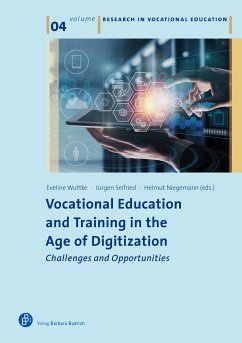Vocational Education and Training in the Age of Digitization (eBook, PDF)
Challenges and Opportunities
Redaktion: Wuttke, Eveline; Niegemann, Helmut M.; Seifried, Jürgen
0,00 €
0,00 €
inkl. MwSt.
Sofort per Download lieferbar

0 °P sammeln
0,00 €
Als Download kaufen

0,00 €
inkl. MwSt.
Sofort per Download lieferbar

0 °P sammeln
Jetzt verschenken
Alle Infos zum eBook verschenken
0,00 €
inkl. MwSt.
Sofort per Download lieferbar
Alle Infos zum eBook verschenken

0 °P sammeln
Vocational Education and Training in the Age of Digitization (eBook, PDF)
Challenges and Opportunities
Redaktion: Wuttke, Eveline; Niegemann, Helmut M.; Seifried, Jürgen
- Format: PDF
- Merkliste
- Auf die Merkliste
- Bewerten Bewerten
- Teilen
- Produkt teilen
- Produkterinnerung
- Produkterinnerung

Bitte loggen Sie sich zunächst in Ihr Kundenkonto ein oder registrieren Sie sich bei
bücher.de, um das eBook-Abo tolino select nutzen zu können.
Hier können Sie sich einloggen
Hier können Sie sich einloggen
Sie sind bereits eingeloggt. Klicken Sie auf 2. tolino select Abo, um fortzufahren.

Bitte loggen Sie sich zunächst in Ihr Kundenkonto ein oder registrieren Sie sich bei bücher.de, um das eBook-Abo tolino select nutzen zu können.
The increasing digitization of the world of work is associated with accelerated structural changes. These are connected with changed qualification profiles and thus new challenges for vocational education and training (VET). Companies, vocational schools and other educational institutions must respond appropriately. The volume focuses on the diverse demands placed on teachers, learners and educational institutions in vocational education and training and aims to provide up-to-date results on learning in the digital age.
- Geräte: PC
- ohne Kopierschutz
- eBook Hilfe
- Größe: 6.62MB
- FamilySharing(5)
Andere Kunden interessierten sich auch für
![Medienkompetenz für die digitale Welt (eBook, PDF) Medienkompetenz für die digitale Welt (eBook, PDF)]() Claudia MertensMedienkompetenz für die digitale Welt (eBook, PDF)0,00 €
Claudia MertensMedienkompetenz für die digitale Welt (eBook, PDF)0,00 €![Dinge - Nutzer - Netze: Von der Virtualisierung des Musealen zur Musealisierung des Virtuellen (eBook, PDF) Dinge - Nutzer - Netze: Von der Virtualisierung des Musealen zur Musealisierung des Virtuellen (eBook, PDF)]() Dennis NiewerthDinge - Nutzer - Netze: Von der Virtualisierung des Musealen zur Musealisierung des Virtuellen (eBook, PDF)0,00 €
Dennis NiewerthDinge - Nutzer - Netze: Von der Virtualisierung des Musealen zur Musealisierung des Virtuellen (eBook, PDF)0,00 €![Bildkompetenz (eBook, PDF) Bildkompetenz (eBook, PDF)]() Florian SchaperBildkompetenz (eBook, PDF)20,99 €
Florian SchaperBildkompetenz (eBook, PDF)20,99 €![Lehren und Lernen mit digitalen Medien und Technologien (eBook, PDF) Lehren und Lernen mit digitalen Medien und Technologien (eBook, PDF)]() Markus SchäferLehren und Lernen mit digitalen Medien und Technologien (eBook, PDF)15,99 €
Markus SchäferLehren und Lernen mit digitalen Medien und Technologien (eBook, PDF)15,99 €![Digitalisierung - Subjekt - Bildung (eBook, PDF) Digitalisierung - Subjekt - Bildung (eBook, PDF)]() Digitalisierung - Subjekt - Bildung (eBook, PDF)0,00 €
Digitalisierung - Subjekt - Bildung (eBook, PDF)0,00 €![Jahrbuch der berufs- und wirtschaftspädagogischen Forschung 2023 (eBook, PDF) Jahrbuch der berufs- und wirtschaftspädagogischen Forschung 2023 (eBook, PDF)]() Jahrbuch der berufs- und wirtschaftspädagogischen Forschung 2023 (eBook, PDF)0,00 €
Jahrbuch der berufs- und wirtschaftspädagogischen Forschung 2023 (eBook, PDF)0,00 €![Jahrbuch der berufs- und wirtschaftspädagogischen Forschung 2020 (eBook, PDF) Jahrbuch der berufs- und wirtschaftspädagogischen Forschung 2020 (eBook, PDF)]() Jahrbuch der berufs- und wirtschaftspädagogischen Forschung 2020 (eBook, PDF)0,00 €
Jahrbuch der berufs- und wirtschaftspädagogischen Forschung 2020 (eBook, PDF)0,00 €-
-
-
The increasing digitization of the world of work is associated with accelerated structural changes. These are connected with changed qualification profiles and thus new challenges for vocational education and training (VET). Companies, vocational schools and other educational institutions must respond appropriately. The volume focuses on the diverse demands placed on teachers, learners and educational institutions in vocational education and training and aims to provide up-to-date results on learning in the digital age.
Dieser Download kann aus rechtlichen Gründen nur mit Rechnungsadresse in A, B, BG, CY, CZ, D, DK, EW, E, FIN, F, GR, H, IRL, I, LT, L, LR, M, NL, PL, P, R, S, SLO, SK ausgeliefert werden.
Produktdetails
- Produktdetails
- Verlag: Verlag Barbara Budrich
- Seitenzahl: 280
- Erscheinungstermin: 26. Oktober 2020
- Englisch
- ISBN-13: 9783847413356
- Artikelnr.: 60453048
- Verlag: Verlag Barbara Budrich
- Seitenzahl: 280
- Erscheinungstermin: 26. Oktober 2020
- Englisch
- ISBN-13: 9783847413356
- Artikelnr.: 60453048
- Herstellerkennzeichnung Die Herstellerinformationen sind derzeit nicht verfügbar.
Editorial and Introduction to the Volume
Editorial: Vocational Education and Training in the Age of Digitization - Challenges and Opportunities (Eveline Wuttke, Jürgen Seifried, and Helmut M. Niegemann)
1 Introduction - A Look Back Ahead (Helmut M. Niegemann)
Section I: Vocational Education and Training in the Age of Digitization
2 The Impact of Learning Factories on Multidisciplinary Digital Competencies (Michael J. J. Roll & Dirk Ifenthaler)
3 Competence Development with Digital Learning Stations in VET in the Crafts Sector (Mareike Schmidt, Alina Makhkamova, Jan Spilski, Matthias Berg, Martin
Pietschmann, Jan-Philipp Exner, Daniel Rugel, & Thomas Lachmann)
4 Tablet PCs in Economics Classes-An Empirical Study on Motivational Experiences and Cognitive Load (Christin Siegfried & Rico Hermkes)
5 Gamification. A Novel Didactical Approach for 21st Century Learning (Silke Fischer & Antje Barabasch)
Section II: Teacher Education and Professional Competence of Teachers in the Age of Digitization
6 Development of a Video-based Test Instrument for the Assessment of Professional Competence in the Vocational Teacher Training Course (Andrea Faath-Becker & Felix Walker)
7 Assessing Professional Knowledge of Teachers at Vocational Schools-Using the Example of a Professional Development for Automation and Digitized Production (Pia Schäfer, Nico Link & Felix Walker)
Section III: Workplace Learning in the Age of Digitization
8 Digital Competences in the Workplace: Theory, Terminology, and Training (Henrike Peiffer, Isabelle Schmidt, Thomas Ellwart & Anna-Sophie Ulfert)
9 Microlearning via Smartphones in VET for Professional Drivers: The Case of Securing Cargo for International Transport (Andreas Korbach & Helmut M. Niegemann)
Section IV: Higher Education in the Age of Digitization
10 Openness in MOOCs for Training and Professional Development- An Exploration of Entry and Participation Barriers (Kristina Kögler, Marc Egloffstein, & Brigitte Schönberger)
11 The High School Career Academy as a Model for Promoting Technological Preparation: Promising Practices and Challenges in the United States (M. Hernandez-Ganter & Edward C. Fletcher)
Conclusions and Outlook
12 Developing a Skillful and Adaptable Workforce: Reappraising Curriculum and Pedagogies for Vocational Education (Stephen Billett)
Authors
Editorial: Vocational Education and Training in the Age of Digitization - Challenges and Opportunities (Eveline Wuttke, Jürgen Seifried, and Helmut M. Niegemann)
1 Introduction - A Look Back Ahead (Helmut M. Niegemann)
Section I: Vocational Education and Training in the Age of Digitization
2 The Impact of Learning Factories on Multidisciplinary Digital Competencies (Michael J. J. Roll & Dirk Ifenthaler)
3 Competence Development with Digital Learning Stations in VET in the Crafts Sector (Mareike Schmidt, Alina Makhkamova, Jan Spilski, Matthias Berg, Martin
Pietschmann, Jan-Philipp Exner, Daniel Rugel, & Thomas Lachmann)
4 Tablet PCs in Economics Classes-An Empirical Study on Motivational Experiences and Cognitive Load (Christin Siegfried & Rico Hermkes)
5 Gamification. A Novel Didactical Approach for 21st Century Learning (Silke Fischer & Antje Barabasch)
Section II: Teacher Education and Professional Competence of Teachers in the Age of Digitization
6 Development of a Video-based Test Instrument for the Assessment of Professional Competence in the Vocational Teacher Training Course (Andrea Faath-Becker & Felix Walker)
7 Assessing Professional Knowledge of Teachers at Vocational Schools-Using the Example of a Professional Development for Automation and Digitized Production (Pia Schäfer, Nico Link & Felix Walker)
Section III: Workplace Learning in the Age of Digitization
8 Digital Competences in the Workplace: Theory, Terminology, and Training (Henrike Peiffer, Isabelle Schmidt, Thomas Ellwart & Anna-Sophie Ulfert)
9 Microlearning via Smartphones in VET for Professional Drivers: The Case of Securing Cargo for International Transport (Andreas Korbach & Helmut M. Niegemann)
Section IV: Higher Education in the Age of Digitization
10 Openness in MOOCs for Training and Professional Development- An Exploration of Entry and Participation Barriers (Kristina Kögler, Marc Egloffstein, & Brigitte Schönberger)
11 The High School Career Academy as a Model for Promoting Technological Preparation: Promising Practices and Challenges in the United States (M. Hernandez-Ganter & Edward C. Fletcher)
Conclusions and Outlook
12 Developing a Skillful and Adaptable Workforce: Reappraising Curriculum and Pedagogies for Vocational Education (Stephen Billett)
Authors
Editorial and Introduction to the Volume
Editorial: Vocational Education and Training in the Age of Digitization - Challenges and Opportunities (Eveline Wuttke, Jürgen Seifried, and Helmut M. Niegemann)
1 Introduction - A Look Back Ahead (Helmut M. Niegemann)
Section I: Vocational Education and Training in the Age of Digitization
2 The Impact of Learning Factories on Multidisciplinary Digital Competencies (Michael J. J. Roll & Dirk Ifenthaler)
3 Competence Development with Digital Learning Stations in VET in the Crafts Sector (Mareike Schmidt, Alina Makhkamova, Jan Spilski, Matthias Berg, Martin
Pietschmann, Jan-Philipp Exner, Daniel Rugel, & Thomas Lachmann)
4 Tablet PCs in Economics Classes-An Empirical Study on Motivational Experiences and Cognitive Load (Christin Siegfried & Rico Hermkes)
5 Gamification. A Novel Didactical Approach for 21st Century Learning (Silke Fischer & Antje Barabasch)
Section II: Teacher Education and Professional Competence of Teachers in the Age of Digitization
6 Development of a Video-based Test Instrument for the Assessment of Professional Competence in the Vocational Teacher Training Course (Andrea Faath-Becker & Felix Walker)
7 Assessing Professional Knowledge of Teachers at Vocational Schools-Using the Example of a Professional Development for Automation and Digitized Production (Pia Schäfer, Nico Link & Felix Walker)
Section III: Workplace Learning in the Age of Digitization
8 Digital Competences in the Workplace: Theory, Terminology, and Training (Henrike Peiffer, Isabelle Schmidt, Thomas Ellwart & Anna-Sophie Ulfert)
9 Microlearning via Smartphones in VET for Professional Drivers: The Case of Securing Cargo for International Transport (Andreas Korbach & Helmut M. Niegemann)
Section IV: Higher Education in the Age of Digitization
10 Openness in MOOCs for Training and Professional Development- An Exploration of Entry and Participation Barriers (Kristina Kögler, Marc Egloffstein, & Brigitte Schönberger)
11 The High School Career Academy as a Model for Promoting Technological Preparation: Promising Practices and Challenges in the United States (M. Hernandez-Ganter & Edward C. Fletcher)
Conclusions and Outlook
12 Developing a Skillful and Adaptable Workforce: Reappraising Curriculum and Pedagogies for Vocational Education (Stephen Billett)
Authors
Editorial: Vocational Education and Training in the Age of Digitization - Challenges and Opportunities (Eveline Wuttke, Jürgen Seifried, and Helmut M. Niegemann)
1 Introduction - A Look Back Ahead (Helmut M. Niegemann)
Section I: Vocational Education and Training in the Age of Digitization
2 The Impact of Learning Factories on Multidisciplinary Digital Competencies (Michael J. J. Roll & Dirk Ifenthaler)
3 Competence Development with Digital Learning Stations in VET in the Crafts Sector (Mareike Schmidt, Alina Makhkamova, Jan Spilski, Matthias Berg, Martin
Pietschmann, Jan-Philipp Exner, Daniel Rugel, & Thomas Lachmann)
4 Tablet PCs in Economics Classes-An Empirical Study on Motivational Experiences and Cognitive Load (Christin Siegfried & Rico Hermkes)
5 Gamification. A Novel Didactical Approach for 21st Century Learning (Silke Fischer & Antje Barabasch)
Section II: Teacher Education and Professional Competence of Teachers in the Age of Digitization
6 Development of a Video-based Test Instrument for the Assessment of Professional Competence in the Vocational Teacher Training Course (Andrea Faath-Becker & Felix Walker)
7 Assessing Professional Knowledge of Teachers at Vocational Schools-Using the Example of a Professional Development for Automation and Digitized Production (Pia Schäfer, Nico Link & Felix Walker)
Section III: Workplace Learning in the Age of Digitization
8 Digital Competences in the Workplace: Theory, Terminology, and Training (Henrike Peiffer, Isabelle Schmidt, Thomas Ellwart & Anna-Sophie Ulfert)
9 Microlearning via Smartphones in VET for Professional Drivers: The Case of Securing Cargo for International Transport (Andreas Korbach & Helmut M. Niegemann)
Section IV: Higher Education in the Age of Digitization
10 Openness in MOOCs for Training and Professional Development- An Exploration of Entry and Participation Barriers (Kristina Kögler, Marc Egloffstein, & Brigitte Schönberger)
11 The High School Career Academy as a Model for Promoting Technological Preparation: Promising Practices and Challenges in the United States (M. Hernandez-Ganter & Edward C. Fletcher)
Conclusions and Outlook
12 Developing a Skillful and Adaptable Workforce: Reappraising Curriculum and Pedagogies for Vocational Education (Stephen Billett)
Authors







